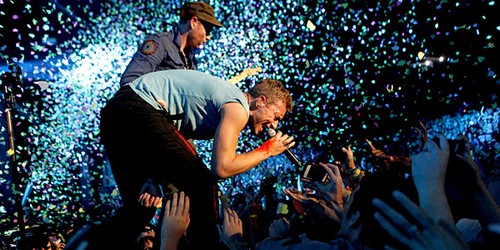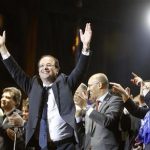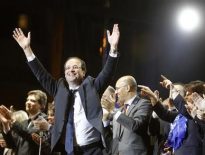Coldplay, Incubus, Soundgarden and more define a rock aesthetic.
What exactly does a rock
band need — and in what quantity — to distinguish itself in today’s exuberantly eclectic pop landscape?

Along with branded beach balls and remembrances of
Adam Yauch of the Beastie Boys, that question seemed to fill the air Saturday at Irvine’s Verizon Wireless Amphitheater,
where KROQ-FM (106.7) presented its annual Weenie Roast y Fiesta. The daylong concert — headlined by Coldplay, with
performances by Incubus, the Offspring and an unannounced Soundgarden, among others — offered several successful takes on
defining a pop aesthetic, but little consensus on the matter.
Still, the Weenie Roast’s variety suggested something
more promising: that in “a Black Eyed Peas world,” as one KROQ DJ put it, rockers are thinking hard about how to specialize
their music. A big crowd response, when it occurred, seemed almost secondary to the effort involved.
The sole
international act on a main stage dominated by Southern Californians, Coldplay matched that geographical distinction with a
show far more elaborate than any other band’s. Last week, the English group played a sold-out three-night stand at the
Hollywood Bowl, and to Irvine it brought a slightly pared version of that high-tech production, complete with lasers,
pyrotechnics and heart-shaped confetti. And that was all during the first two songs.
Cutting-edge though they may have been, Coldplay’s theatrics amounted to old-fashioned showbiz razzmatazz, a physical
embodiment of the widescreen sentiment in the band’s material.
“You use your heart as a weapon, and it hurts like
heaven,” frontman Chris Martin sang in “Hurts Like Heaven” from last year’s “Mylo Xyloto”; other songs pondered faith, war
and the power of music itself over arrangements that embellished rock guitars with sampled strings and rave-style
synths.
Martin and his bandmates knew Weenie Roast’s pumped-up audience differed somewhat from their own, so they
skipped a handful of folky numbers and “Princess of China,” an R&B-accented collaboration with Rihanna. But Coldplay
didn’t disavow its essential tenderness: Near the end of the band’s hourlong set, Martin paid tribute to Yauch, who died
Friday, with a hushed piano-ballad rendition of the Beastie Boys’ “(You Gotta) Fight for Your Right (to
Party).”
Incubus was similarly expansive, delivering philosophical hard-rock songs whose dense, multipartite
structures kept revealing fresh details: a funk-derived bass line, for instance, or harsh electronic squiggles by the band’s
DJ, Chris Kilmore. Yet singer Brandon Boyd’s spiritual-dude vibe almost reached the level of self-parody, as when he tied
his long hair in a bun and picked up a pair of mallets for an aimless drum solo.
Tom DeLonge of Blink-182 faced the
same threat with his histrionic emo-punk project, Angels & Airwaves. And though Silversun Pickups exuded an appealingly
low-key attitude, the group’s music seemed overwhelmed by Brian Aubert’s neo-shoegaze guitar.
Two veterans of West
Coast punk — Pennywise and the Offspring — fared better with a less-is-more approach, blazing through speedy, tightly
constructed songs about phony authority and suburban ennui. “You want a slow one?” Pennywise guitarist Fletcher Dragge asked
at one point. Then he answered himself in a fashion that can’t be quoted here before offering a breakneck take on “Fight for
Your Right,” one tougher but no less affectionate than Coldplay’s.
PHOTOS: KROQ’s Weenie Roast y Fiesta 2012
As Weenie Roast’s surprise guests,
Soundgarden had perhaps the evening’s easiest job: Simply showing up onstage Saturday was enough to warrant huge cheers. Yet
these reunited grunge survivors played with a lumbering intensity that demonstrated the continued usefulness of rock’s
component parts.
In “Spoonman,” guitarist Kim Thayil and bassist Ben Shepherd intertwined menacing lead lines, while
drummer Matt Cameron drove “Jesus Christ Pose” with a muscular precision. And singer Chris Cornell flexed his
still-impressive yowl throughout the band’s set, most memorably in “Slaves & Bulldozers,” in which he incorporated a few
lines from “In My Time of Dying,” the gospel traditional once covered by Soundgarden’s forebears in Led
Zeppelin.
Like a negative image of Coldplay’s Day-Glo pop, Soundgarden’s heavy, blues-based semi-metal had a solid
sense of itself and its strength. It didn’t do anything more than it needed to, and that was plenty.





